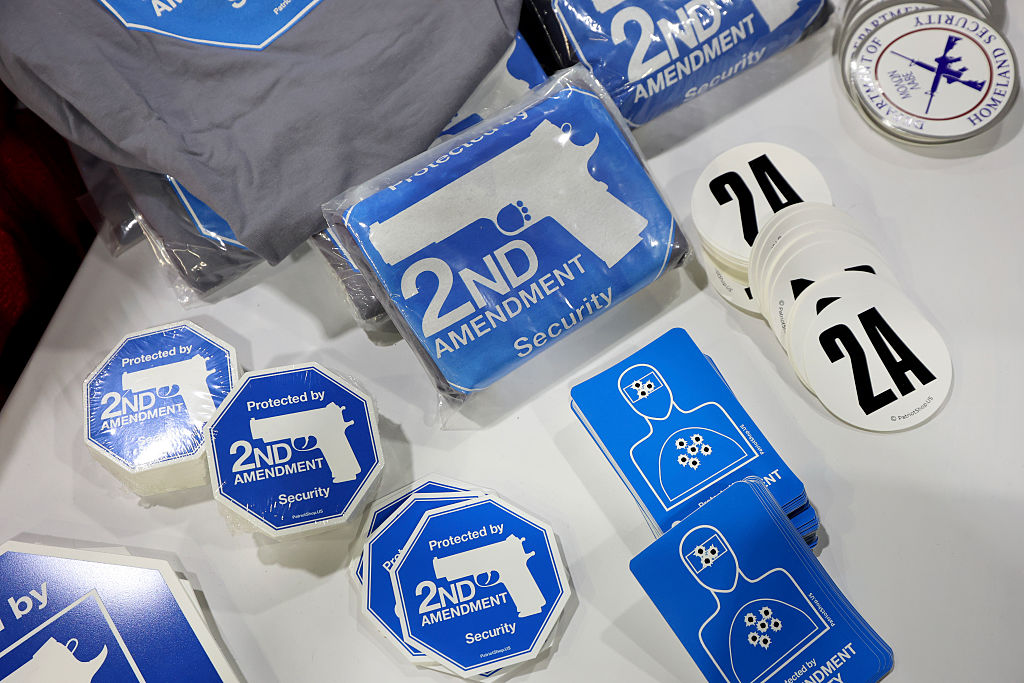Second Amendment in the spotlight


If you’ve followed coverage of the Supreme Court’s 2025-26 term over the past few months, you’d likely say this term’s theme is executive power. The court already has added three major cases on the scope of presidential authority to its oral arguments docket – the tariffs dispute and two battles over removing federal agency leaders – and will have the opportunity to take up more, including cases on President Donald Trump’s executive order on birthright citizenship. The court is also fielding several requests related to executive power on the interim docket, perhaps most prominently being Trump’s deployment of the National Guard.
By the time the dust settles on this term, however, the court may have also had a great deal to say about the Second Amendment. So far this fall, the justices have taken up two cases on gun rights, and they’ll be considering several additional petitions on Second Amendment issues over the next two weeks.
The landscape post-Bruen
This wave of gun cases is hitting the Supreme Court three years after it found a New York law unconstitutional that heavily restricted the ability to carry a gun in public in New York State Rifle & Pistol Association v. Bruen. That decision, written by Justice Clarence Thomas, is perhaps best known for its text, history, and tradition analysis. As Haley Proctor explained in a recent column for SCOTUSblog, the court instructed judges tasked with resolving a gun rights dispute to determine “whether the Second Amendment’s plain text covers the conduct in which the challenger wishes to engage,” and if it does, whether the challenged law “is consistent with the Nation’s historical tradition of firearm regulation.”
According to research from The Trace, an outlet focused on gun rights and gun violence, Bruen sparked thousands of lawsuits, as gun rights supporters pushed to have old and new gun laws alike assessed under the text, history, and tradition test. Now, several of those lawsuits have made it to the Supreme Court, where the justices are being asked to resolve rapidly developing divisions between courts of appeals.
Here’s a brief overview of the two Second Amendment questions that the court has agreed to address this term and two others that the justices will consider taking up during conferences this month.
Do gun owners need express permission to carry a gun onto private property?
In Wolford v. Lopez, the court will consider a Hawaii law that makes it a crime for someone with a concealed carry permit to carry a gun onto private property that’s open to the public without seeking – and receiving – permission to do so first. The permission requirement is one part of Hawaii’s broader “sensitive places” law, which, like other, similar measures across the country, was passed after Bruen with the goal of imposing new gun restrictions.
The challengers to Hawaii’s law, as well as the Trump administration, contend the state’s rule for concealed carry on private property amounts to an almost complete ban on public carry that has no corollary in Founding-era gun restrictions. The U.S. Court of Appeals for the 9th Circuit’s decision in favor of Hawaii “conflicts with Bruen’s recognition that the Nation does not have ‘a tradition of broadly prohibiting the public carry of commonly used firearms for self-defense,’” wrote U.S. Solicitor General D. John Sauer.
The court announced on Wednesday that it will hear arguments in Wolford on Tuesday, Jan. 20.
Can habitual drug users own guns?
In United States v. Hemani, the court is considering whether a federal law that prohibits a person from owning a gun if they are “an unlawful user of or addicted to any controlled substance” violates the Second Amendment. The Trump administration, which brought the question to the court in multiple petitions, contends that such a prohibition is constitutional because “there are compelling legal and historical reasons” to keep guns away from habitual drug users. “This restriction provides a modest, modern analogue of much harsher founding-era restrictions on habitual drunkards, and so it stands solidly within our Nation’s history and tradition of regulation,” wrote Sauer in the petition for review.
The court’s eventual ruling in the case will likely resolve a conflict between the courts of appeals over the law’s application. The U.S. Court of Appeals for the 7th Circuit has held that the government does not violate the Second Amendment when it disarms “presumptively risky people,” such as habitual drug users, while the U.S. Court of Appeals for the 8th Circuit has said the government should only be able to enforce the statute after proving that the drug users “pose[s] a credible threat to the physical safety of others.” The U.S. Court of Appeals for the 5th Circuit has held that the statute should only apply to individuals who were actually impaired by the drug use at the time they possessed a gun.
In the Hemani case, the 5th Circuit cited its past rulings as it upheld the district court’s decision to dismiss the gun charge against the defendant. The 5th Circuit stated that the government acknowledged that its evidence was deficient to prove that Hemani was using drugs at the time when he was found in possession of a firearm. (The government has said that the FBI became interested in Hemani’s actions because of he and his family’s connections to and comments about foreign terrorists.)
The Supreme Court is expected to hear this case sometime in early 2026.
Can 18-to-20-year-olds own guns?
On Friday, Nov. 14, the justices are set to consider four petitions on the gun rights of young adults. Specifically, these cases ask whether barring 18-to-20-year-olds from owning a gun violates the Second Amendment.
The court declined an opportunity to weigh in on this debate earlier this year when, in April, it chose not to review Jacobson v. Worth, which concerned a Minnesota statute preventing adults younger than age 21 from receiving gun permits. By passing on the case, the court left in place a ruling that said the statute violated the Second Amendment.
Now, the same question is back in front of the justices in petitions that emphasize what rights young adults have under the Second Amendment to possess a firearm. “[F]or an entire class of Americans, the Second Amendment has become a national patchwork, with the availability of the right to keep and bear arms contingent on one’s state of residence,” one petitioner wrote.
The court will release an order list on Monday, Nov. 17, so we could know by then whether the justices will take up this issue.
Can nonviolent offenders own guns?
During the court’s Nov. 21 conference, it’s expected to address at least two petitions on a different Second Amendment issue: whether the federal ban on firearm possession by anyone who has been convicted of “a crime punishable by imprisonment for a term exceeding one year” is unconstitutional as applied to nonviolent offenders.
The question has been raised by Steven Duarte, who was convicted under the statute due to past convictions such as vandalism, firearm possession, drug possession, and evading a police officer, and Melynda Vincent, who was convicted under the statute due to a past conviction “for trying to pass a bad check.” Both point to a circuit split on the issue that has developed since the court released its Bruen decision.
Sauer filed a response with the court to Vincent’s petition in which he urged the court to deny review in her case. He noted that the “Department of Justice recently revitalized an administrative process … through which convicted felons can regain their ability to possess firearms,” arguing that, if given time, this policy shift might resolve the circuit split. In her reply brief, Vincent contended that revitalizing the program does not resolve the core issue, which is that the statute should not be permissible under the Second Amendment.
Sauer waived his right to respond to Duarte’s petition.
The Second Amendment term?
In the weeks ahead, the justices will consider even more petitions on gun rights, including one on whether the Second Amendment guarantees a right to possess AR-15s and other semiautomatic rifles. We shall see if this surge in gun-related petitions will result in a term as big on Second Amendment issues as it is on executive power.
Posted in Court Analysis, Merits Cases, Potential Merits Cases
Cases: New York State Rifle & Pistol Association Inc. v. Bruen, Wolford v. Lopez, National Rifle Association v. Glass, United States v. Hemani, Paris v. Second Amendment Foundation, West Virginia Citizens Defense League, Inc. v. Bureau of Alcohol, Tobacco, Firearms, and Explosives, McCoy v. Bureau of Alcohol, Tobacco, Firearms, and Explosives